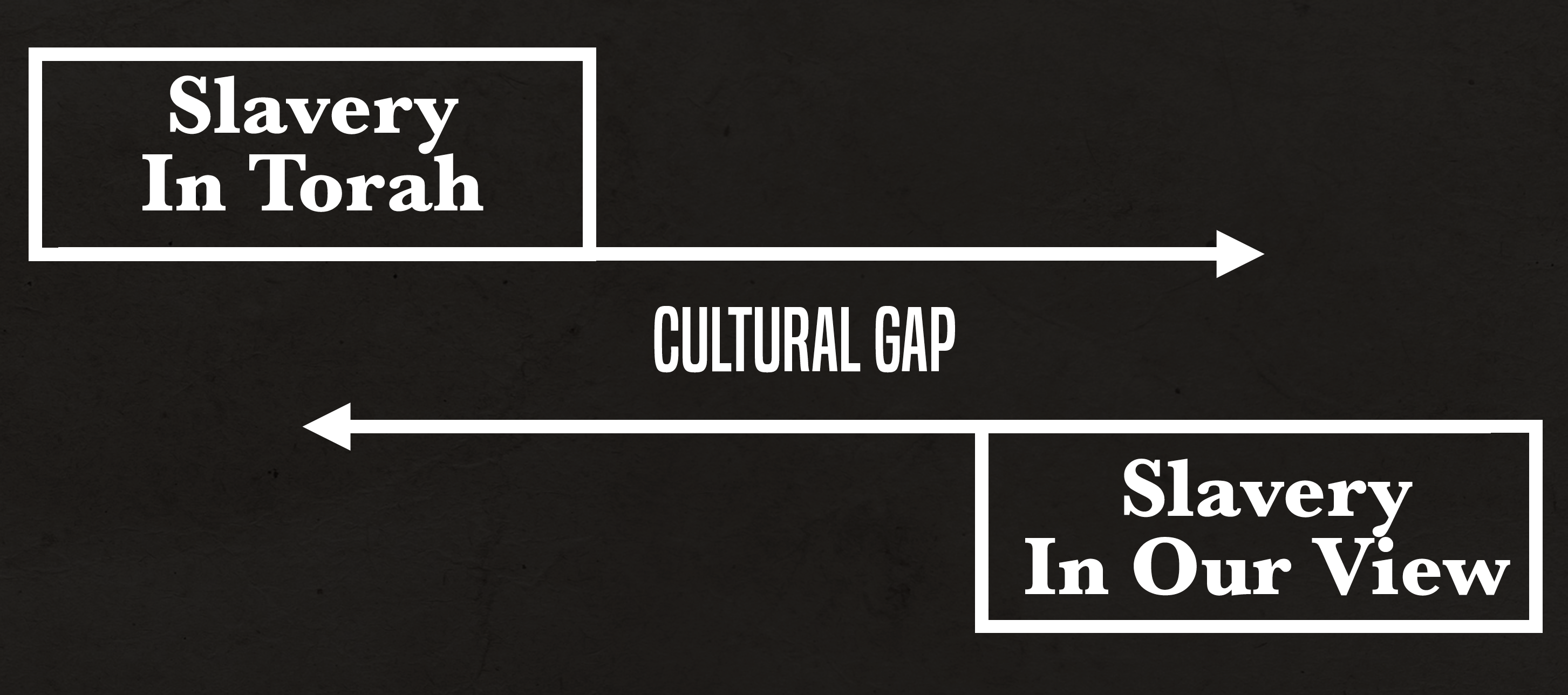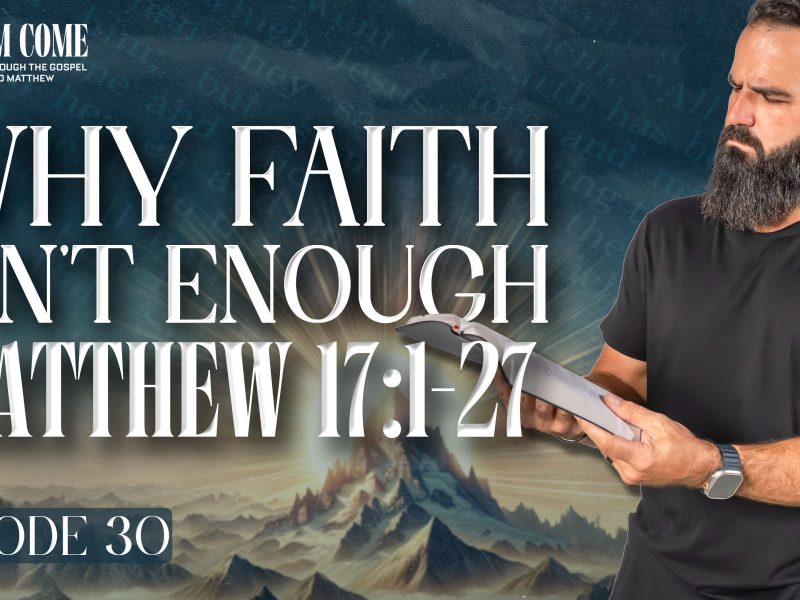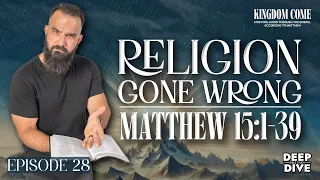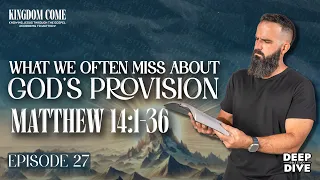About This Project
Why is there Slavery in the Bible?
This topic is one that Bible skeptics love to cherry-pick so they can validate their disbelief in or rejection of God.
What does God say about Israel and the Land and the treatment of foreign slaves? And why didn’t the Torah eliminate slavery?
On this podcast, we examine the hard passages and take an investigative look at slavery in the Torah in the Books of Exodus 21: 1-11, Leviticus 25: 23-55, and Ezekiel 47: 21-23.
This captivating discussion addresses tough questions and skeptic arguments head-on, providing a comprehensive understanding of the historical and cultural context surrounding slavery in ancient Israel. Delve into why the Torah didn’t eradicate slavery and discover how these passages fit into God’s larger plan for humanity.
Whether you seek to strengthen your faith, grapple with challenging biblical passages, or expand your understanding of God’s Word, this episode is for you. Take advantage of this opportunity to deepen your knowledge and engage with timeless truths.
We pray that this study will help you trust God and His Word even more than you currently do. Let’s dive into the Text!
☑️ You can partner with us to get the message out with a one-time gift at Tim Hatch Live Support OR on the Cash App with cashtag: $timhatchlive
💥 Become a monthly partner and enjoy loads of exclusive channel perks at Tim Hatch Live Patreon
✳20% of all giving will be tithed back out to The American Bible Society and Project Rescue.
Start [0:00]
▶ Why do Christians need to know about slavery in the Bible? [0:30]
▶ Laws about slaves in the Bible Exodus 21 explained [4:30]
▶ Laws about slavery in the Bible Exodus 21: 1-4 explained [6:48]
▶ Laws about slavery in the Bible Exodus 21: 5-6 explained [15:08]
▶ Laws about slavery in the Bible Exodus 21: 7-11 explained [19:50]
▶ In what context would it be acceptable for one person to own another person as their property as in the Bible verse Leviticus 25: 44-46? [31:15]
▶ Laws about slavery in the Bible Leviticus 25: 55 explained [49:02]
▶ Israel and the Land in Ezekiel 47: 21-23 explained [55:34]
▶ What is God’s big plan for the world? [56:50]
Scriptures Studied: Exodus 21:1-11; Leviticus 25:23-55; Ezekiel 47:21-23

Slavery: The Hard Passages
Exodus 21:1–4 (ESV) “Now these are the rules that you shall set before them.
2 When you buy a Hebrew slave, he shall serve six years, and in the seventh he
shall go out free, for nothing. 3 If he comes in single, he shall go out single; if
he comes in married, then his wife shall go out with him. 4 If his master gives
him a wife and she bears him sons or daughters, the wife and her children shall
be her master’s, and he shall go out alone.
Torah: Protecting the community from the individual.
- The man became a slave because he was broke.
- The slave still broke after years of slavery could not afford the family he had been “given”.
- The point – was to incentivize the slave to work in such a way that he could later afford the bride price and take his family.
- This does not imply the wife and children were perpetual slaves.
- The law provided an opportunity for life-long protection of this man’s livelihood in service to his master.
- The choice was the SLAVES, not the masters.
- Love for the master and family is to be considered.
- A picture of our relationship to God.
Piercing of the Ear
Psalm 40:5–6 (NIV) Many, O Lord my God, are the wonders you
have done. The things you planned for us no one can recount to you;
were I to speak and tell of them, they would be too many to declare.
6 Sacrifice and offering you did not desire, but my ears you have
pierced; burnt offerings and sin offerings you did not require.
Slavery: The Hard Passages…
Exodus 21:7–11 (ESV) “When a man sells his daughter as a slave,
she shall not go out as the male slaves do. 8 If she does not please
her master, who has designated her for himself, then he shall let her
be redeemed. He shall have no right to sell her to a foreign people,
since he has broken faith with her. 9 If he designates her for his son,
he shall deal with her as with a daughter. 10 If he takes another wife
to himself, he shall not diminish her food, her clothing, or her
marital rights. 11 And if he does not do these three things for her,
she shall go out for nothing, without payment of money.
GOD insists AUTHORITY and POWER are RESTRAINED.
Happy Slaves in the Bible
1. Joseph – served Potiphar and wanted to do right by him rejecting the opportunity to commit adultery with his wife.
2. Eliezer of Damascus – Abraham’s main house servant who found a bride for Isaac and thereby undercut his opportunity at any inheritance.
3. Slave girl to Naaman of Syria – who told her master about the prophet in Israel who could heal him of leprosy.
4. Elisha “served” Elijah (pouring water on his hands).
“Which Society had a better foundation?
The Bible (2500 B.C. / 60 A.D.)
Exodus 21:16 (ESV) “Whoever steals a man and sells him, and anyone found in possession of him, shall be put to death.
1 Timothy 1:8–10 (ESV) Now we know that the law is good, if one uses it lawfully, 9 understanding this, that the law is not laid down for the just but for the lawless and disobedient, for the ungodly and sinners, for the unholy and profane, for those who strike their fathers and mothers, for murderers, 10 the sexually immoral, men who practice homosexuality, enslavers, liars, perjurers, and whatever else is contrary to sound doctrine,”
“Fugitive Slave Act of 1850 (America):
If you didn’t return a fugitive slave you were liable,
It also made the federal government responsible for finding, returning and trying escaped slaves.”
10 main facts about Greek and Roman Slavery:
1. Slaves were not identified by appearance or clothing.
2. Slaves shared cultural and religious traditions with their owners.
3. Education was encouraged for slaves.
4. Functioned in highs position in the household – managers, accountants, tutors, sea captains, physicians.
5. The bottom of society were free persons who had to find work every day with no certainty of employment.
6. Slaves owned property (including other slaves). They could accumulate funds to secure their freedom.
7. No laws prohibited the public assembly of slaves from all classes.
8. Slaves had families of their own and were not considered part of the owners “Family”.
9. Slaves often sold themselves willingly to climb socially or obtain special government positions.
10. The majority were set free at age 30 and were made citizens of Rome.
Question: “I was wondering in what “Context” would it be acceptable for one person to own another person as their property?”
We still “OWN” people:
1. Prisons.
2. Some instances of “power of attorney”
3.Conservatorship.
4.Surrogacy.
Pope Francis blasts surrogacy as a “deplorable” practice
BIBLICAL RESPONSE: You’ve Buried the Lead
Slavery: The Hard Passages:
Leviticus 25:44–46 (ESV) As for your male and female slaves
whom you may have: you may buy male and female slaves from
among the nations that are around you. 45 You may also buy from
among the strangers who sojourn with you and their clans that are
with you, who have been born in your land, and they may be your
property. 46 You may bequeath them to your sons after you to
inherit as a possession forever. You may make slaves of them, but
over your brothers the people of Israel you shall not rule, one over
another ruthlessly.
Leviticus 25:23 (ESV) “The land shall not be sold in perpetuity, for
the land is mine. For you are strangers and sojourners with me.
Leviticus 25:24 (ESV) And in all the country you possess, you shall
allow a redemption of the land.
Leviticus 25:35 (ESV) “If your brother becomes poor and cannot
maintain himself with you, you shall support him as though he were
a stranger and a sojourner, and he shall live with you.
Leviticus 25:39–43 (ESV) “If your brother becomes poor beside
you and sells himself to you, you shall not make him serve as a slave:
40 he shall be with you as a hired worker and as a sojourner. He
shall serve with you until the year of the jubilee. 41 Then he shall go
out from you, he and his children with him, and go back to his own
clan and return to the possession of his fathers. 42 For they are my
servants, whom I brought out of the land of Egypt; they shall not be
sold as slaves. 43 You shall not rule over him ruthlessly but shall fear
your God.
Leviticus 25:55 (ESV) For it is to me that the people of Israel are
servants. They are my servants whom I brought out of the land of
Egypt: I am the LORD your God.
Ezekiel on the Land:
Ezekiel 47:21–23 (ESV) “So you shall divide this land among you
according to the tribes of Israel. 22 You shall allot it as an
inheritance for yourselves and for the sojourners who reside among
you and have had children among you. They shall be to you as
native-born children of Israel. With you they shall be allotted an
inheritance among the tribes of Israel. 23 In whatever tribe the
sojourner resides, there you shall assign him his inheritance, declares
the Lord GOD.
Questions to Consider:
- How do skeptics often use discussions about slavery in the Bible to support their disbelief in God?
- What are some key passages in the Torah regarding the treatment of slaves and the land ownership laws?
- Why do you think the Torah didn’t outright eliminate slavery, and what purpose might it have served in the context of ancient Israel?
- How can understanding the historical and cultural context of slavery in biblical times help us interpret these passages more accurately?
- What are some biblical examples of individuals who were slaves but demonstrated faithfulness and integrity in their situations? How can we apply their stories to our lives today?
⬇️ Tim Hatch Live ⬇️
🎙 The Deep End dives deeper into Faith, Politics, Bible, & the world, Tues 7:30p & on your favorite podcast app
📖 Deep Dive Bible Study Kings of Compromise, Weds 7:30p
❓10 Questions with Tim, Q&A segment providing answers, LIVE 1st Thurs, Noon
👉 Ask Anything email ask@timhatchlive.com
🔵 WATCH MORE
🔵 BOOKS
🔵 SWAG
🔵 RUMBLE
🔵 FACEBOOK
🔵 TWITTER
🔵 INSTAGRAM
🔵 TIKTOK










No Comments